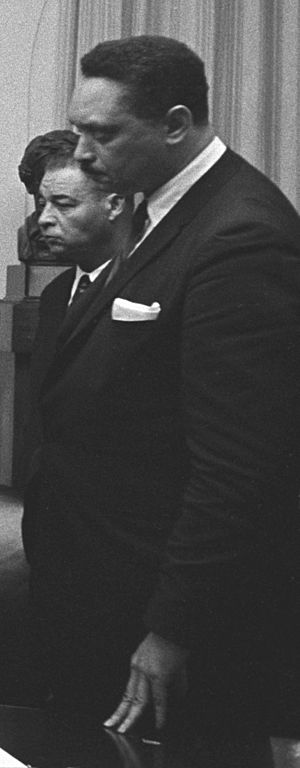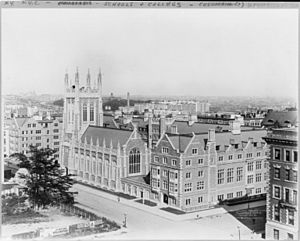Leon Sullivan facts for kids
Quick facts for kids
Leon Sullivan
|
|
|---|---|
 |
|
| Born |
Leon Howard Sullivan
October 16, 1922 |
| Died | April 24, 2001 (aged 78) Scottsdale, Arizona, U.S.
|
| Education | West Virginia State University Union Theological Seminary (BA) Columbia University (MA) |
| Movement | Civil Rights Movement Anti-Apartheid Movement |
Leon Howard Sullivan (born October 16, 1922 – died April 24, 2001) was an important American leader. He was a Baptist minister and a strong voice for civil rights. He worked hard to create job training for African Americans. He also fought against Apartheid, a system of unfair racial separation in South Africa. Leon Sullivan was a member of the General Motors Board for many years. He passed away at age 78 from leukemia.
Contents
Leon Sullivan's Early Life
Leon Sullivan was born in Charleston, West Virginia. He grew up in a very poor part of the city. His parents divorced when he was three years old. He was an only child.
A moment when he was 12 years old changed his life. He tried to buy a Coca-Cola at a drugstore. The owner told him, "Stand on your feet, boy. You can't sit here." This unfair treatment made Leon want to fight against racial prejudice his whole life.
His grandmother, Carrie, was also a big influence. She taught him about faith, determination, and helping himself.
As a teenager, Leon was very tall, about 6 feet 5 inches. He went to Garnet High School, a school for African Americans. He earned scholarships for basketball and football at West Virginia State University. A foot injury ended his sports career. He then worked in a steel mill to pay for college.
Becoming a Baptist Minister
Leon Sullivan became a Baptist minister at 18 in West Virginia. In 1943, another famous minister, Adam Clayton Powell Sr., encouraged him. Leon moved to New York City. He studied at the Union Theological Seminary and Columbia University. He also worked as an assistant minister at the Abyssinian Baptist Church.
In New York, he met his wife, Grace. They had three children: Hope, Julie, and Howard. One of his achievements was helping 100 Black men join the police force in Harlem. He did this with the support of Mayor Fiorello LaGuardia.
In 1945, Leon and Grace moved to South Orange, New Jersey. Leon became a pastor there. Five years later, they moved to Philadelphia. He became the pastor of Zion Baptist Church. People called him "the Lion of Zion" because of his strong leadership.
Fighting for Jobs: The Selective Patronage Movement
Leon Sullivan believed that good jobs were key to improving life for African Americans. In the early 1940s, he helped organize a march in Washington, D.C.. This was his first step in the Civil Rights Movement.
Starting in 1958, he asked big companies in Philadelphia to interview young Black people. Only two companies agreed. So, Leon organized a boycott of businesses. He called it "Selective Patronage." The slogan was "Don't buy where you don't work." This boycott worked very well. Black people made up about 20% of Philadelphia's population.
Leon believed the boycott created thousands of jobs for African Americans in four years. The New York Times and Fortune magazine wrote about his success. By 1962, Dr. Martin Luther King Jr. and the SCLC learned about his methods. This led to SCLC's own economic program, Operation Breadbasket, in 1967. It was led by Jesse Jackson.
The Self-Help Movement
Leon Sullivan's work was based on "self-help." This means giving people the tools to overcome poverty and unfairness. African Americans often could not get the training needed for better jobs. Leon realized that just having jobs available was not enough. He said, "Integration without preparation is frustration."
In 1964, Leon founded Opportunities Industrialization Centers (OIC) of America. He started it in an old jail house in North Philadelphia. The program trained people with little hope for jobs and life skills. Then, it helped them find work.
This idea quickly spread across the nation. OIC grew into a large movement. It has helped over two million people who needed job skills. In 1969, the Opportunities Industrialization Centers International (OICI) was also formed.
Around the same time, Leon started the Zion Investment Association (ZIA). This company invested in and started new businesses. He also helped create over 20 programs under the International Foundation for Education and Self-Help (IFESH). These programs included the African-African American Summit. IFESH has sent teachers to Africa, trained bankers, built schools, and helped fight diseases.
The 10-36 Plan: Community Investment
Leon Sullivan used the church to bring the Black community together. He wanted to create a local economy that could grow on its own. In 1962, he shared his idea of self-help through investment. He asked 50 people to put in $10 each for 36 months. This money would help build things the community would own.
The "10-36 Plan" created two groups. For the first 16 months, people gave money to the Zion Non-Profit Charitable Trust (ZNPCT). This group supported education, scholarships, and health services. For the next 20 months, money went to Progress Investment Associates (PIA). This was a for-profit company that would start businesses.
After 36 months, investors received a share of stock. They could then take part in yearly meetings. This system encouraged the community to get involved. Leon believed in "giving before receiving." He wanted people to understand that their money would help future generations.
The 10-36 Plan quickly raised money. In 1964, PIA bought an apartment building. This helped fight unfair housing practices against Black people. A year later, PIA built Zion Gardens, a large apartment complex. This $1 million project used 10-36 funds to get loans and grants.
The plan continued to grow. In 1965, 450 more people joined. The Progress Movement successfully used the money from the 10-36 Plan. They used it to get more funds from banks and other sources.
Progress Plaza: A Community Hub
After OIC, Leon's next big project was building the nation's first shopping center owned and developed by Black people. It was called Progress Plaza. He wanted to create jobs and more Black-owned businesses in North Philadelphia.
He convinced the city to donate land for the project. Then, he needed money to build it. He went to a bank for a loan. The bank chairman said he needed to show some of his own money first. Leon then showed him $400,000 in funds from the 10-36 Plan. The banker was amazed and agreed to work with him. Leon said, "$400,000 makes a difference in race relations in America!"
Progress Plaza opened in 1968 on Broad Street in Philadelphia. Ten thousand people came to the dedication. The shopping center created many construction jobs for OIC participants. It also created management jobs for African Americans in the stores.
To help Black-owned businesses, ZNPCT created an Entrepreneurial Training Center at Progress Plaza. This center taught business skills to hundreds of people. Today, more than half of the 16 stores in Progress Plaza are owned by Black businesses.
The Progress Movement also wanted to help with social needs. ZNPCT built a Human Services Center next to Progress Plaza. This center offers important services. It has a Social Security Administration office, an unemployment office, and a health center run by Temple University.
In the 1980s, Wendell Whitlock took over Progress Plaza. In 2018, Progress Plaza celebrated its 50th anniversary.
Leon H. Sullivan Summit
Leon Sullivan started the first Summit in Abidjan, Côte d'Ivoire in 1991. African leaders wanted to talk with leaders from other countries. The Summit brings together political and business leaders from around the world. They focus on helping Africa's economy and social development.
Leon Sullivan believed that developing Africa needed global partnerships. He especially wanted people of African descent and "Friends of Africa" to be involved.
Today, the Leon H. Sullivan Summit is organized by the Leon H. Sullivan Foundation. This group works to continue Leon Sullivan's vision of helping those in need. His daughter, Hope Masters, now leads the foundation.
Awards and Honors
Leon Sullivan received many awards for his work:
- The Ten Outstanding Young Americans Award, 1955
- The Afro-American Achievement Award, 1956
- The Freedom Foundation Award, 1960
- Life Magazine named him one of the 100 outstanding young adults, 1963
- The Russwurm Award, 1963
- The Philadelphia Bok Award, 1966
- The William Penn Award, 1967
- The Edwin T. Dahlberg Peace Award, 1968
- The Spingarn Medal by the NAACP, 1971
- The Silver Buffalo Award by the Boy Scouts of America, 1971
- The Award for Greatest Public Service Benefiting the Disadvantaged, Jefferson Awards, 1975
- 28th Laurel Wreath Awardee, 1979
- The Common Wealth Award of Distinguished Service, 1986
- The Four Freedoms Award by the Roosevelt Institute, 1987
- The Presidential Medal of Freedom, America's highest civilian award, from President George H. W. Bush, 1991
- The Bishop John T. Walker Distinguished Humanitarian Service Award by Africare, 1995
- The Eleanor Roosevelt Award for Human Rights by President Bill Clinton, 1999
In August 2000, Charleston, West Virginia, renamed Broad Street to Leon Sullivan Way. This was near his childhood home. In 2022, the international arrivals hall at Philadelphia International Airport was named in his honor.
He also received honorary degrees from over 50 colleges. He served on the boards of General Motors, Mellon Bank, and the Boy Scouts of America.
Books by Leon H. Sullivan
- America is theirs: And other poems (1948)
- Build Brother Build (1969)
- Alternatives to Despair (1972)
- Philosophy of a Giant (1979)
- Moving Mountains: The Principles and Purposes of Leon Sullivan (1998)
 | Calvin Brent |
 | Walter T. Bailey |
 | Martha Cassell Thompson |
 | Alberta Jeannette Cassell |


